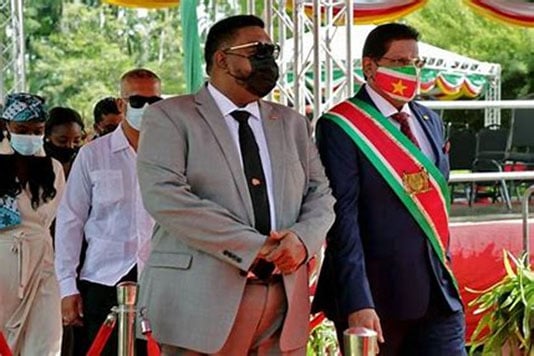Guyana’s neighbour to the east, Suriname would appear to be enjoying an enhanced measure of generous attention from the international financial community, though by contrast, the fact that while both of the two South Ameri-can oil-rich countries would appear to be embracing a shared oil-driven future that might make them the next global standout petro economies, what international analysts might see as a relatively trivial issue involving Guyanese fishermen plying their trade in the shared Corentyne river continues to be a source of sourness between the countries.
Indeed, even as the two countries continue to be the leading cheerleaders for each other in their ongoing quest, Suriname to receive funds from the IMF to establish themselves as South Ameri-ca’s most recent petro power, Guyanese fishermen find themselves frequently arrested by the Surinamese military whenever they are caught fishing in the river with their vessels impounded in the bargain. While it appears that it is a routine process, occurring without the excessive use of force, the circumstance, nonetheless, appears quizzical in the light of what otherwise appears to be a fairly amicable relationship between the two countries.
Just a few years ago, Presidents Irfaan Ali of Guyana and Chandrikaprasad Santokhi of Suriname paid visits to each other’s capitals as part of what appeared to be a carefully choreographed signal that the likely petro fortunes of the two countries would metamorphose into an across-the-board relationship that would see the two one-time poverty-stricken countries grow together. The two Presidents staged several seemingly choreographed meetings to provide high profile optical evidence of the direction in which they appeared to be going. With the recent significant advancement of Suriname’s petro ambitions, the way may yet be opening up for a return to the period of high-profile engagement out of which may well arise efforts to enhance relations between the two countries.
A sign of changing international perceptions of the direction in which the now oil-assured economy of Suriname appears to be heading was reflected in the recent disclosure that the International Monetary Fund (IMF) had announced that Paramaribo had become eligible to receive US$61.5 million in financial assistance following a successful review of the multi-million dollar Extended Fund Facility. The total funding allocated to Suriname by the IMF, so far, amounts to US$362.6 million. Up to this time, there has been no acceleration in the plans for joint projects that would redound to be benefit of the two neighbouring countries and which emerged from the earlier high profile diplomatic offensive by Presidents Ali and Santoki.
While the pleasing ‘noises’ between the two countries that had dominated relations up to just over a year ago have subsided, one expects that Suriname’s current priority will be to secure the earliest possible access to its now confirmed oil resources so that it can use its petro resources as leverage with which to ‘re-engineer’ its internal economic resuscitation.
From June 4-7, Suriname staged its fourth Energy, Oil & Gas Summit under the theme “The Next Stage of Success”; Suriname has recently won a nod of approval from the IMF Deputy Managing Director for what the Fund says has been the country’s effective pursuit of reforms under the EFF-supported programme, which the Fund says is increasingly reflected in macroeconomic stability and improving investor perceptions.








